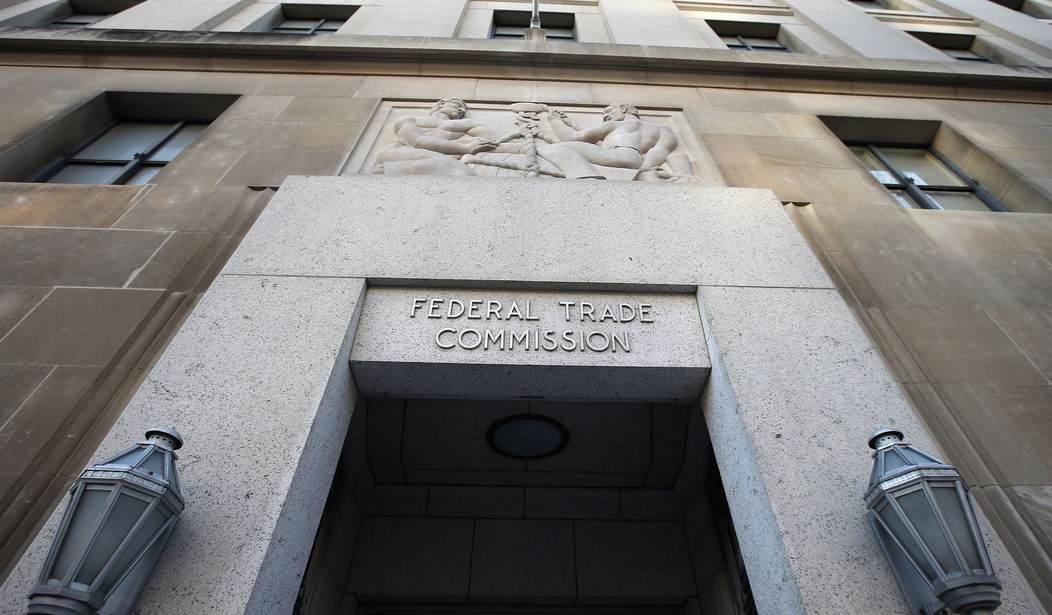Antitrust law has garnered a lot of attention in Washington, particularly as those on the left try to target big tech companies like Google and Facebook. But regardless of whether an antitrust bill passes, Democratic commissioners of the Federal Trade Commission (FTC) are quietly progressing an agenda that punitively punishes businesses. Due to the anti-democratic setup of the agency, these commissioners are able to wield outsized control over our economy.
The FTC was established as an independent agency of the government to enforce civil U.S. antitrust law and promote consumer protection. While its commissioners are supposed to be “independent,” they are nominated by the sitting president and approved by the Senate, which makes the board inherently political. Not only this, but Congress mandates that the five-person committee has no more than three members of the same political party, meaning the party in control can override any opposition.
This is especially concerning because there is no standard practice for how the FTC decides to investigate a company for antitrust violations, and commissioners are often encouraged to launch an inquiry based on congressional or media pressure. This system is ripe for political pressure to punish businesses unnecessarily or unfairly.
This is why it was unsurprising to see the FTC’s new chair, nominated by President Joe Biden, push through a laundry list of Democratic priorities while also trying to expand the commission's rule-making authority and even considering getting rid of the FTC’s administrative law judge, who presides over rulemaking. Instead, giving the chair or “a person of her choosing” the authority to act as the presiding office.
Thankfully, the two Republicans on the committee have spoken out against this power grab by these unelected bureaucrats, but we need them to continue opposing liberal-minded government interference by the commission.
Far too often, the FTC has overstepped its authority or flaunted its lack of checks and balances to punish businesses the commissioners in power seemingly don’t like. With issues regarding big tech coming before the commission, Americans cannot expect the chair to issue a fair vote after her repeated history of attacking these same companies - particularly when the commission has unilateral power to determine if their judgements are fair.
Recommended
It is no wonder the Supreme Court is now put in a position to challenge the FTC’s authority. The FTC recently went after a relatively small body cam business, Axon, forcing them to “completely unwind” their acquisition of Vievu, a competitor who was losing money, without providing their analysis to prove why they opposed the merger.
But even when the FTC makes a decision that is seemingly unwarranted, it then gets appealed to the FTC-chosen administrative law judge. And even if that judge disagrees with the FTC, the commission can overrule them - which is why they have a 100% win record in the administrative court.
Additionally, some courts have claimed the judicial branch lacks jurisdiction to even challenge the FTC procedures, meaning there is no one to hold the FTC accountable when they overstep.
Unfortunately, we have seen this same shameful process play out over and over again. The latest example is Altria’s recent acquisition of a portion of electronic cigarette maker JUUL Labs. In February, the Chief Administrative Law Judge D. Michael Chappell dismissed the antitrust charges issued by the FTC against Altria Group, Inc. because the judge found the FTC had failed to demonstrate that the acquisition would have anti-competitive effects, which in theory, they should have to be able to prove.
Unfortunately, we can expect the commission to overrule the judge and maintain their position because there are no checks and balances to ensure the commission is operating within its designed parameters.
It will likely take a ruling by the High Court to finally rein in the FTC.
As Commissioner Noah Phillips recently highlighted, the role of the FTC is to protect consumer welfare, which is dependent on a whole host of factors. But Democrats seem more focused on breaking apart “big businesses” or preventing large corporations from growing, regardless of what that means for consumers, which is often higher prices and poorer quality of services. Hopefully, the FTC will return to this original mission - if not, they will rightly risk losing authority.

























Join the conversation as a VIP Member